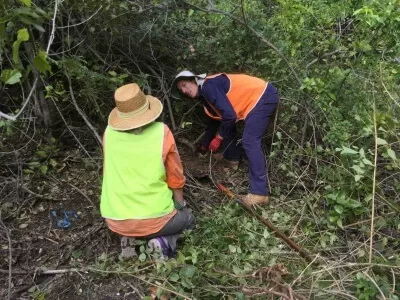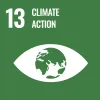Overview
Volunteering Solutions, in collaborazione con la nostra organizzazione partner in Nuova Zelanda, riunisce volontari per piantare e prendersi cura di alberi autoctoni, controllare parassiti ed erbacce e proteggere specie minacciate. Se condividete un amore innato per le specie in via di estinzione e per Madre Natura in generale, allora il Programma di Volontariato per la Conservazione in Nuova Zelanda sarebbe la scelta perfetta per voi.
La Nuova Zelanda è un paese pittoresco situato nell'Oceano Pacifico sud-occidentale, composto da due isole principali, entrambe caratterizzate da vulcani e ghiacciai. Tuttavia, negli ultimi decenni, a causa dei notevoli cambiamenti climatici e dell'aumento generale delle temperature, la bellezza naturale del paese ha subito un forte impatto.
Grazie a questi programmi avrai l'opportunità di vedere la vera natura selvaggia dell'ambiente della Nuova Zelanda e, aiutando con il taglio dei sentieri, il controllo dei parassiti e il monitoraggio degli animali, darai un contributo duraturo alla conservazione di questi luoghi e delle creature che li abitano per gli anni a venire.
Che si tratti di piantare alberi in inverno, liberarli in primavera e in estate o preparare il terreno per la piantumazione in autunno, ti divertirai un sacco e troverai sempre qualcosa di nuovo da imparare durante il tuo viaggio di volontariato in Nuova Zelanda.
Progetto di volontariato nell'Isola del Nord, Nuova Zelanda
L'Isola del Nord è ricca di fiumi, regioni vulcaniche, spiagge appartate ma spettacolari, nonché fitte foreste pluviali e paesaggi rurali. I volontari che si uniscono al progetto nell'Isola del Nord dovranno iniziare il loro viaggio da Auckland o Wellington, dove incontreranno i nostri coordinatori locali.
AUCKLAND - Ad Auckland, i progetti sono focalizzati sul ripristino della biodiversità in città. Dalle nostre piantagioni autoctone su larga scala presso l'Ātiu Creek Regional Park e il Papakura Stream alla manutenzione dei sentieri, alla rimozione delle erbe infestanti invasive e alla pulizia dei rifiuti, ci sono molti modi per contribuire a sostenere il mondo naturale.
WELLINGTON - A Wellington i progetti si concentrano sulla creazione di corridoi per le nostre specie autoctone. A Belmont Park, il team locale sta rimboschindo una foresta con il vostro aiuto. Sono numerosi i progetti a cui partecipare, tra cui la manutenzione dei sentieri, la rimozione delle erbe infestanti invasive e la pulizia delle coste.
Progetto di volontariato nell'Isola del Sud, Nuova Zelanda
A Christchurch, i volontari stanno ripristinando i corridoi fluviali e le zone umide per proteggere meglio i corsi d'acqua della regione e i suoi numerosi uccelli, lucertole e insetti autoctoni. Lavorerai presso la nostra sede principale, il corridoio fluviale Ōtakaro Avon, e anche in progetti più piccoli in città. Contribuirai anche ai nostri progetti nello splendido porto di Whakaraupō Lyttelton.
Orario di lavoro volontario
Orario di lavoro volontario
I progetti si svolgono normalmente su 5 giorni a settimana, con uno o due giorni liberi a settimana per rilassarsi o visitare la città. L'orario di lavoro è dalle 8:00 alle 16:00, anche se per alcuni progetti può variare in base alle condizioni stagionali o alle attività del progetto.
I volontari si recano in una sede diversa del progetto ogni settimana o due. Ciò significa che in un'Esperienza di Conservazione di 6 settimane, è possibile visitare diverse località e intraprendere diverse attività di conservazione, a seconda delle esigenze di conservazione e della disponibilità del progetto in quel momento. Integriamo la massima varietà possibile nel nostro programma, concentrandoci sulla conservazione essenziale come obiettivo principale.
Tutti i volontari partecipano a una sessione di orientamento della durata di circa un'ora, che si tiene al loro arrivo per partecipare al programma alle 11:00 di venerdì.
Successivamente, i volontari saranno trasferiti presso le strutture ricettive locali o in sedi regionali in treno, autobus o veicolo (ci occupiamo noi di tutti gli spostamenti dei volontari). Il primo fine settimana è libero per i volontari, anche se occasionalmente potrebbe essere necessario spostarsi la domenica se si recano in una località di progetto molto remota.
I volontari saranno avvisati quando il loro caposquadra verrà a prenderli per il primo progetto, solitamente alle 8:00 di lunedì mattina (gli orari possono variare leggermente a seconda della stagione).
Ulteriori introduzioni si svolgono in ogni sede del progetto, gestite dal Team Leader prima che i volontari inizino ogni attività. Queste includono:
Gli obiettivi di conservazione del progetto specifico
Come verrà svolto, comprese eventuali istruzioni o formazione richieste ai volontari
Informazioni essenziali sulla sicurezza
Servizi in loco/nelle vicinanze
Ruoli e responsabilità dei volontari
Ruoli e responsabilità dei volontari
Il tipo di attività che i volontari intraprenderanno dipenderà dalla stagione e dalle esigenze di conservazione dell'area. Sebbene i volontari non possano scegliere il tipo di attività da svolgere, ci impegniamo a fondo per garantire loro un'ampia gamma di opportunità e luoghi.
In estate, le tue attività potrebbero includere la coltivazione di piantine autoctone, la pulizia dei rifiuti, la rimozione delle erbacce, la manutenzione di sentieri e piste ciclabili e altro ancora. In inverno, invece, ti occuperai principalmente della piantumazione e della preparazione dei siti di piantumazione.
Prima di offrirti volontario per un progetto, il tuo Team Leader ti spiegherà gli obiettivi del progetto e ti aiuterà a completare l'attività in modo sicuro ed efficace.
Il tipo di progetto dipende dal periodo dell'anno, dalle condizioni meteorologiche e dal tipo di lavoro svolto da ciascun team locale. State tranquilli, avrete un impatto positivo sulla biodiversità della Nuova Zelanda.
Dovresti essere ragionevolmente in forma e preparato per partecipare al meglio delle tue capacità. Il tuo Team Leader ti mostrerà come utilizzare tutti gli strumenti e le attrezzature in modo sicuro prima di iniziare ogni progetto e sarà sempre a tua disposizione per aiutarti. Chiedi sempre se hai dubbi sulle istruzioni: siamo qui per aiutarti!
Project Requirement
Project Requirement
I volontari devono avere almeno 18 anni al momento dell'adesione al progetto. Devi avere una mente aperta e un atteggiamento flessibile per lavorare in un ambiente nuovo e diverso. Il volontario dovrebbe portare energia ed entusiasmo per fare la differenza e dovrebbe essere disposto a lavorare all'aperto e sporcarsi le mani. Dovresti essere fisicamente in forma poiché il volontariato in questo programma comporterebbe attività all'aperto che possono essere faticose.
Schedule a Google Meet with a Program Advisor
Interested in our programs? We're here to provide expert guidance
- Get Detailed Info
- 20 min One -on-One meeting
- Get expert advise
- Application Guidance
Photo Gallery
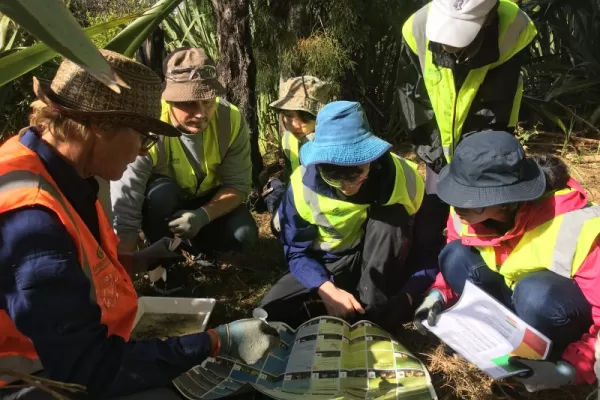
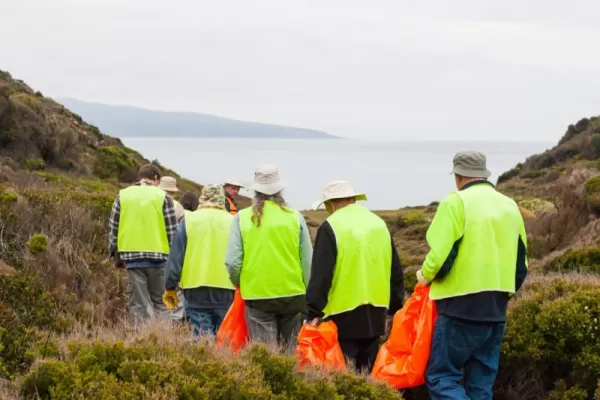
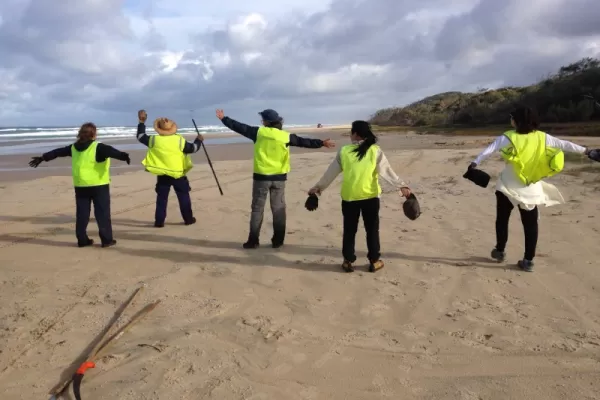
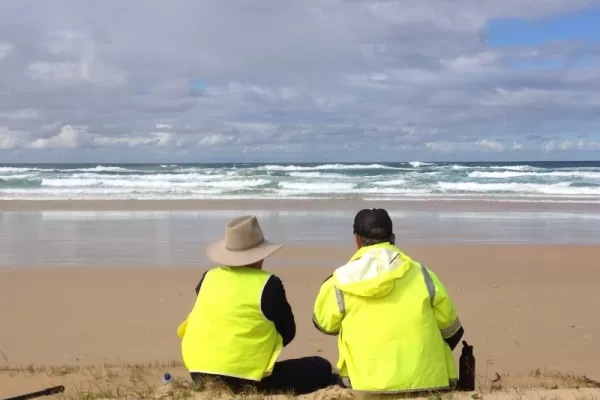
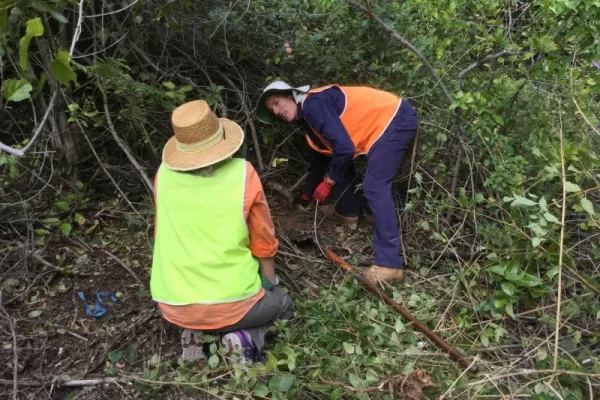
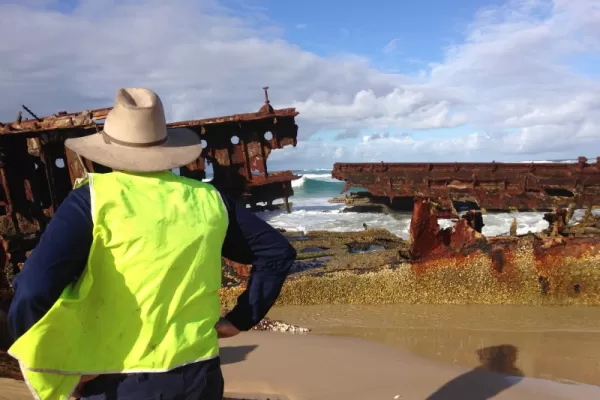
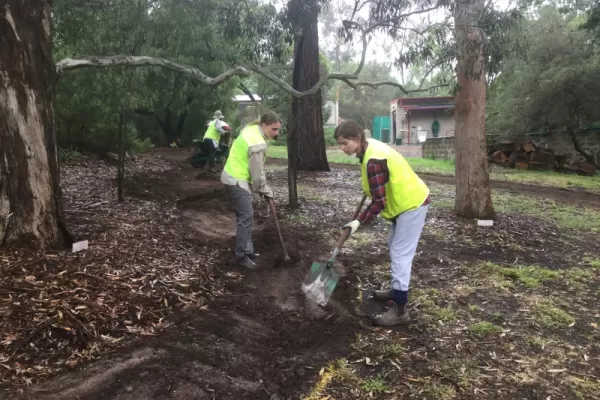
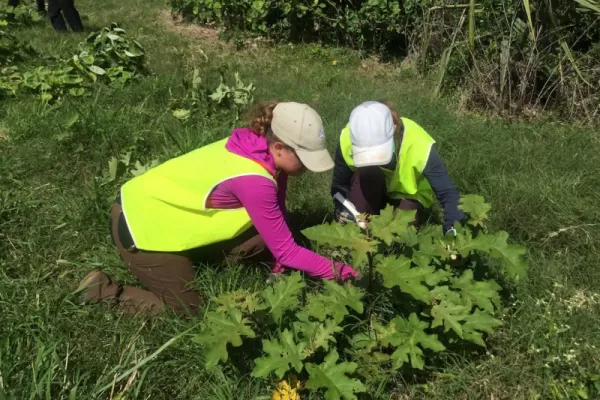
Living
Living
Arrivo in Nuova Zelanda
Tutti i partecipanti dovranno presentarsi al punto d'incontro indicato il giorno di inizio del programma, ovvero venerdì alle ore 11:00. L'indirizzo completo e le istruzioni saranno forniti in anticipo ai partecipanti. Si prega di notare che il programma non prevede il servizio di prelievo dall'aeroporto e i partecipanti dovranno presentarsi direttamente all'indirizzo indicato.
Orientamento
Non appena arrivati nel luogo da voi scelto, dovrete recarvi al sito di progetto assegnato, dove incontrerete il vostro coordinatore di progetto. Lui/lei vi fornirà un orientamento dettagliato. Durante l'orientamento, affronterete argomenti come sicurezza, ubicazione, trasporti, cose da vedere, ecc. Al termine dell'orientamento, verrete accompagnati al vostro alloggio e avrete il resto della giornata per sistemarvi. A seconda della data di arrivo, potreste avere a disposizione il fine settimana per esplorare il luogo e sarete liberi di farlo.
Alloggio
Il tipo di alloggio offerto ai volontari varia a seconda della sede del progetto e può essere in un ostello o in una casa per volontari. Tutti gli alloggi saranno puliti e confortevoli. Tutti i volontari sono tenuti a portare con sé un sacco a pelo ed essere disposti a condividere camere e bagni.
Pasti
I pasti forniti riflettono la dieta locale della Nuova Zelanda. Per colazione, ai volontari vengono generalmente forniti cereali, pane o toast, tè e caffè. Il pranzo consiste solitamente in un panino fatto in casa e frutta; la sera, i volontari gustano un pasto preparato dal gruppo, in genere pasta, arrosto o un'opzione vegetariana. I volontari aiutano nella preparazione dei pasti e nella pulizia dei piatti, oltre ad alcuni lavori domestici, se necessario. Facciamo affidamento sulla piena partecipazione di ogni volontario al programma e la cena è un momento molto apprezzato della giornata. Possiamo soddisfare le esigenze dei vegetariani, ma se i volontari hanno esigenze dietetiche molto specifiche (ad esempio, allergie alimentari), potrebbero dover provvedere autonomamente al proprio pasto. Si prega di comunicare eventuali esigenze dietetiche particolari al momento della prenotazione.
Durante il tuo tempo libero
Avrete tempo libero nei fine settimana e ci sono molte cose da fare e molti luoghi da visitare. I partecipanti possono recarsi nelle principali città durante il fine settimana, a seconda del tempo libero assegnato dal responsabile del progetto. I partecipanti dell'Isola del Nord potranno recarsi ad Auckland per esplorare la città, mentre quelli dell'Isola del Sud potranno recarsi a Queenstown o Christchurch per il fine settimana.
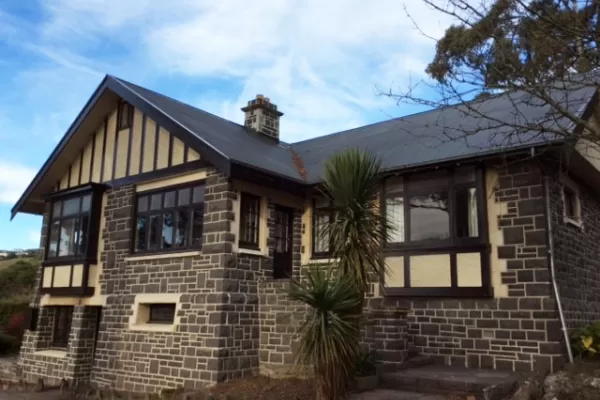
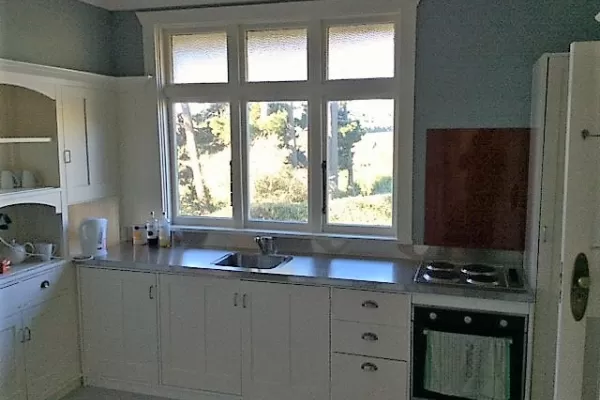
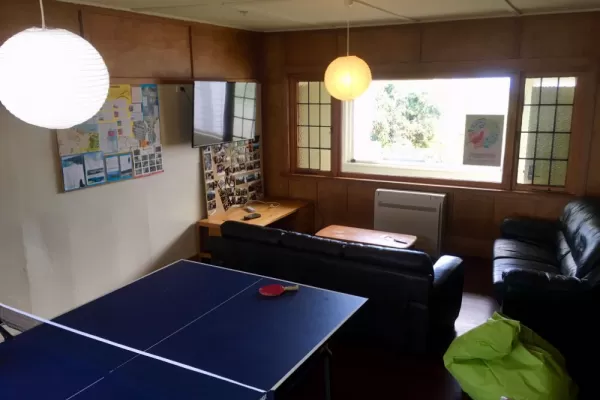
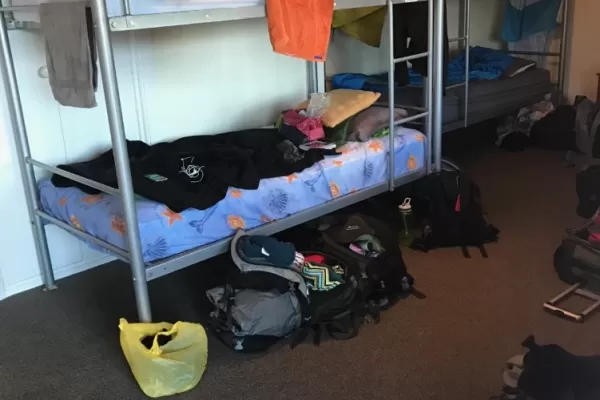
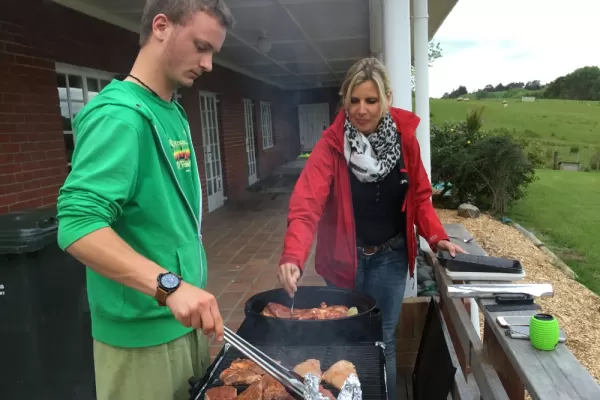
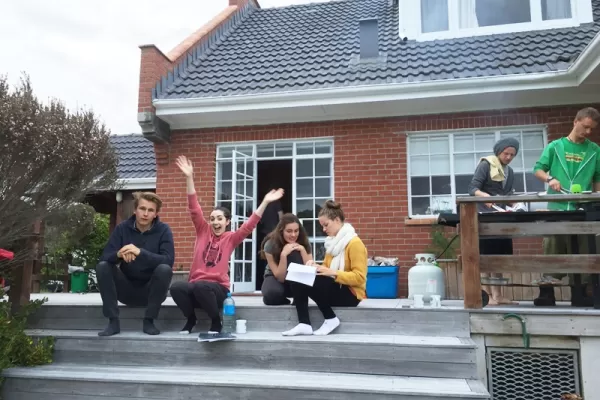
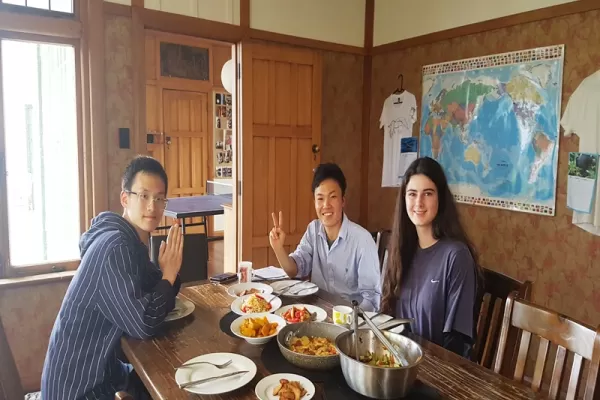
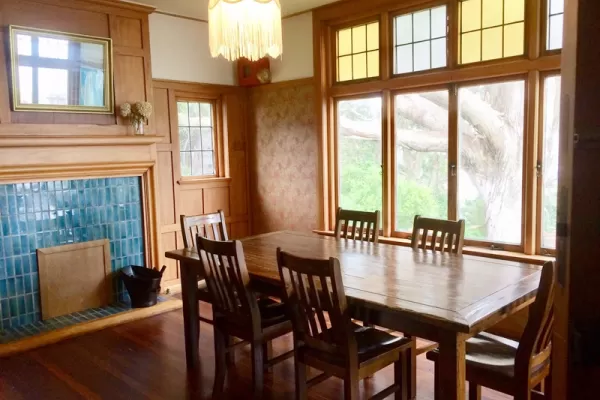
Dates
Dates
January
09
16
23
30
February
06
13
20
27
March
06
13
20
27
April
03
10
17
24
May
01
08
15
22
29
June
05
12
19
26
July
03
10
17
24
31
August
07
14
21
28
September
04
11
18
25
October
02
09
16
23
30
November
06
13
20
27
January
08
15
22
29
February
05
12
19
26
March
05
12
19
26
April
02
09
16
23
30
May
07
14
21
28
June
04
11
18
25
July
02
09
16
23
30
August
06
13
20
27
September
03
10
17
24
October
01
08
15
22
29
November
05
12
19
26
Costs
| Duration |
Program Fee
|
Choose your currency
|
|---|---|---|
| 1 Week | $582 | |
| 2 Weeks | $1014 | |
| 3 Weeks | $1495 | |
| 4 Weeks | $1950 | |
| 5 Weeks | $2395 | |
| 6 Weeks | $2845 | |
| Extra Week | $595 |
Please Note: A registration fee of is charged in addition to the program fee. This fee is valid for one year, during which participants may enroll in multiple programs. A 5% international banking fee applies to credit card payments of program fee made in USD or AUD.
Per cosa stai pagando?
- Tutti i pasti, compresi i fine settimana
- Tutti gli alloggi, compresi i fine settimana
- Viaggi legati al progetto
- Volontari guida sulla fauna selvatica o sulle piante
- Informazioni prima della partenza
- Orientamento e induzione all'arrivo
- Supporto al progetto locale
Cosa NON è incluso?
- Viaggio al punto di partenza in ufficio
- Oneri per visti e passaporti
- Costo voli
- Spese di partenza, aeroportuali e aeree
- Lavanderia, spese mediche, assicurazione di viaggio personale e oggetti di natura personale
FAQ's
Alloggio, pasti e vita quotidiana
-
Che tipo di pasti mi verranno forniti?
-
Forniamo ai volontari in Nuova Zelanda cibo sano basato su una dieta tipica locale. I pasti sono un'attività di gruppo in cui tutti i volontari aiutano a cucinare e pulire. Alcuni esempi di pasti includono cereali, toast, tè e caffè per colazione; panini e frutta per pranzo; e pasti come pasta, barbecue, curry o piatti saltati in padella per cena.
-
Condividerò la camera da letto o il bagno con altre persone?
-
Sì, tutti gli alloggi e i bagni di questo programma sono condivisi. A seconda della sede del progetto e del tipo di alloggio, le stanze potrebbero essere condivise oppure potrebbero esserci stanze separate per i volontari uomini e donne.
-
È disponibile l'accesso a Internet?
-
Di solito, nei fine settimana è possibile trovare un internet café o una biblioteca con accesso a internet. L'accesso a internet non è disponibile presso gli alloggi per volontari: anche se si possiede un computer portatile, la connessione wireless a banda larga non è spesso disponibile al di fuori delle grandi città.
-
Quanti bagagli posso portare?
-
È sempre meglio viaggiare leggeri. Dato che lo spazio è limitato, chiediamo ai volontari di portare con sé un bagaglio di massimo 15 kg in uno zaino o in una borsa morbida. Suggeriamo ai volontari di portare con sé un piccolo zainetto per il pranzo, la crema solare, una borraccia, ecc.
-
Posso portare con me un computer portatile o un tablet?
-
Si tratta di una scelta assolutamente personale. Tieni presente che non possiamo fornire un'assicurazione o garantire la custodia sicura di oggetti come i computer portatili: dovrai assumerti la piena responsabilità della loro custodia.
Connettiti con i volontari del passato
-
Puoi mettermi in contatto con altri volontari che hanno partecipato a questo programma?
-
Possiamo fornire i dati di contatto solo degli ex volontari che hanno acconsentito alla condivisione dei loro dati. Tuttavia, esiste un gruppo Facebook per volontari passati e presenti a cui siete invitati a partecipare. Sono inoltre disponibili centinaia di recensioni online dei nostri ex volontari, oltre a post sui social media su Instagram , TikTok e sul nostro canale YouTube .
-
Posso incontrare altri volontari prima del mio arrivo?
-
La cosa migliore da fare è unirsi al nostro gruppo Facebook e pubblicare un post in cui specifichi la data di inizio, in questo modo potrai entrare in contatto direttamente con altri volontari che si uniscono nello stesso momento.
Informazioni su voli, arrivi e visti
-
Verrò prelevato all'aeroporto al mio arrivo?
-
No, dovrai raggiungere autonomamente il punto di incontro/ufficio che sarà il tuo punto di partenza. Tutti i punti di incontro/uffici si trovano in posizioni abbastanza centrali e ti forniremo le indicazioni per raggiungerli. Devi arrivare in ufficio entro le 11:00 di venerdì mattina ed essere pronto per iniziare il tuo programma.
-
Posso avere maggiori informazioni su come ottenere un visto per la Nuova Zelanda?
-
Se sei cittadino del Regno Unito o di qualsiasi altro Paese che abbia un accordo di esenzione dal visto con la Nuova Zelanda, puoi soggiornare nel Paese per 3 mesi senza visto. Tuttavia, ottenere un visto non è poi così difficile. Puoi semplicemente compilare il modulo di domanda online e optare per il visto. Per maggiori informazioni sul visto, puoi consultare questa pagina o contattare il nostro consulente del programma.
Panoramica del programma e processo di candidatura
-
Esistono requisiti necessari per partecipare ai programmi di volontariato in Nuova Zelanda?
-
I volontari devono avere almeno 18 anni al momento dell'adesione al progetto. È necessario avere una mentalità aperta e un atteggiamento flessibile per lavorare in un ambiente nuovo e diverso. Il volontario deve portare energia ed entusiasmo per fare la differenza ed essere disposto a lavorare all'aperto e a sporcarsi le mani. I volontari devono avere un ragionevole livello di forma fisica per partecipare a questo programma. È necessario essere a proprio agio nell'essere attivi all'aperto (ad esempio piantando alberi, pacciamando e diserbando) per cinque o sei ore al giorno. I volontari devono essere preparati a partecipare al meglio delle proprie capacità. Eventuali infortuni, allergie o condizioni mediche preesistenti che possano influire sulla partecipazione devono essere dichiarati al momento della prenotazione.
-
Qual è il momento migliore per candidarsi a un progetto di volontariato in Nuova Zelanda?
-
Poiché i posti disponibili nei nostri programmi sono limitati e le richieste vengono accolte in base all'ordine di arrivo, si consiglia vivamente di candidarsi e prenotare il proprio posto con largo anticipo. È possibile prenotare il proprio posto compilando un modulo online e versando la quota di iscrizione. Una volta completata la domanda, il proprio "Account Personale" personale sarà attivo e riceverà la conferma di inserimento, dopodiché sarà possibile pagare la quota di iscrizione. È possibile pagare la quota di iscrizione anche in un secondo momento, a rate, ma 45 giorni prima dell'inizio del programma.
-
Come posso fare domanda per un programma e quando devo pagare?
-
Puoi prenotare il tuo posto compilando il modulo di domanda online e versando la quota di iscrizione. Puoi pagare la quota del programma in un secondo momento o anche a rate; tuttavia, il pagamento completo deve essere effettuato 45 giorni prima dell'inizio del programma. Se fai volontariato in un gruppo, puoi anche compilare un modulo di domanda di gruppo. La quota di iscrizione iniziale verrà rimborsata nel caso improbabile in cui non fossimo in grado di offrirti un posto nel programma e avrai la possibilità di richiedere una modifica della data di inizio entro la scadenza di pagamento di 45 giorni (soggetto a disponibilità per altre date).
-
Per quanto tempo posso fare volontariato in Nuova Zelanda?
-
Quanto vuoi! Diremmo, più siamo, meglio è! La maggior parte dei volontari si unisce al nostro programma per almeno quattro settimane, ma molti rimangono molto più a lungo. Ricorda che puoi prenotare diverse località di partenza e organizzare il tuo viaggio in modo da adattare il volontariato ai tuoi programmi di viaggio in Nuova Zelanda. I nostri programmi si svolgono a blocchi settimanali, con inizio il venerdì alle 11:00 e fine il venerdì dopo le 16:00.
Nota: se il soggiorno supera una settimana, i pasti e l'alloggio nel fine settimana sono ovviamente inclusi. -
Posso fare volontariato in più di una sede di partenza?
-
Sì, certo, molti volontari scelgono di prenotare da due o più sedi di partenza. Se scegli questa opzione, dovrai organizzare e pagare il viaggio tra le sedi di partenza. Dovresti lasciare trascorrere una settimana tra le tue prenotazioni o organizzare un rientro nella nuova sede di partenza il lunedì mattina, poiché non possiamo accogliere volontari che arrivano nei fine settimana.
-
Posso fare volontariato con un amico?
-
Sì! Nel nostro modulo di candidatura puoi specificare il nome dell'amico/a o del partner con cui ti candidi. Accettiamo prenotazioni da singoli: puoi candidarti da solo o con i tuoi amici. Se fai volontariato da solo, non preoccuparti: la maggior parte delle persone si iscrive come singolo individuo e farai amicizia molto velocemente!
-
Sono necessarie competenze particolari per fare volontariato?
-
No, preparati solo a partecipare al meglio delle tue capacità! Ci sarà sempre un Team Leader con te, pronto a spiegarti il progetto (inclusi i motivi di conservazione), a mostrarti esattamente cosa fare e come farlo in sicurezza. Con questo programma imparerai molte nuove competenze.
-
C'è un'introduzione o un orientamento? Cosa succede quando inizio il programma?
-
Sì. La sessione di orientamento si terrà il venerdì, all'inizio del programma. Ti spiegheremo tutto ciò che devi sapere, comprese le informazioni essenziali sulla sicurezza, e ti presenteremo al nostro staff e agli altri volontari. Dopodiché, avrai del tempo libero per rilassarti e conoscere gli altri volontari, prima di iniziare il tuo primo progetto lunedì.
-
Quando saprò quali attività svolgerò durante la mia esperienza di conservazione?
-
Poiché la maggior parte dei nostri programmi dipende dalle condizioni stagionali e da una priorità di conservazione, di solito assegniamo risorse e volontari circa 2 settimane prima dell'inizio di ogni progetto. Ti faremo sapere quali attività svolgerai durante il tuo inserimento al tuo arrivo.
-
Posso scegliere quali attività di conservazione intraprendere?
-
No. Il nostro programma varia a seconda del periodo dell'anno, delle condizioni meteorologiche e delle priorità di conservazione. Prepareremo un programma di attività di conservazione per te.
-
Farò le stesse attività ogni giorno?
-
Dipenderà dalle circostanze e dalle necessità, ovviamente. In alcune settimane, potrai completare un progetto importante, come far parte di un team che pianta mille alberi o costruisce un percorso pedonale. In altre settimane, potresti svolgere diverse attività ogni giorno. Ogni settimana o due, i tuoi progetti cambieranno location. Cerchiamo di includere la massima varietà possibile nel programma, pur mantenendo l'attenzione sulle priorità di conservazione, perché è per questo che ti sei offerto volontario.
-
Quanto tempo dedicherò ai progetti di conservazione? Quanto tempo libero avrò?
-
I nostri programmi si svolgono solitamente dal lunedì al venerdì, con weekend liberi. Questo orario può variare di volta in volta per progetti a distanza, in cui i volontari trascorrono 10 giorni in una località remota, seguiti da una pausa più lunga, o quando è necessario recarsi presso la sede del progetto nei fine settimana. L'orario di lavoro è normalmente dalle 8:00 alle 16:00.
-
A che ora lascerò il programma?
-
I nostri programmi terminano il venerdì. Le attività si concludono normalmente entro le 16:00, tuttavia, potresti dover tornare con il resto del team in ufficio o prendere un treno per tornare in città (organizzeremo noi il viaggio per te). I nostri Team Leader di solito si offriranno di accompagnarti vicino al centro città, alla stazione o alla fermata dell'autobus, se più comodo, oppure puoi chiamare un taxi per farti venire a prendere in ufficio.
-
Posso ottenere uno sconto per partecipare a questo programma?
-
Se sei un volontario di ritorno, riceverai uno sconto di 50 $ sulla quota di iscrizione. Inoltre, se vieni in un gruppo di 5 o più persone, richiedi uno sconto e lo valuteremo sicuramente.
-
Posso ricevere qualche tipo di riconoscimento dopo aver completato il mio lavoro?
-
Sì, una volta terminato il tuo lavoro, Volunteering Solutions ti fornirà un Certificato di Completamento.
Salute, sicurezza e supporto
-
Quanto devo essere in forma?
-
Questo è un programma attivo e dovresti essere ragionevolmente in forma. Se in qualsiasi momento hai dubbi sulla tua idoneità per qualsiasi attività, ti preghiamo di parlarne con il tuo Team Leader.
-
Cosa succede se ho una patologia preesistente o un infortunio?
-
Al momento della prenotazione, è necessario dichiarare eventuali condizioni mediche preesistenti, allergie o lesioni. Le informazioni fornite saranno trattate con riservatezza, ma ci aiuteranno a gestire la vostra condizione in modo sicuro. È sempre meglio comunicarcelo, in modo da potervi assistere adeguatamente. In alcuni casi, potremmo chiedervi di ottenere ulteriori informazioni dal vostro medico prima di poter accettare la prenotazione. Se riteniamo di non poter accettare la vostra prenotazione perché non riteniamo che la partecipazione sia sicura per voi, ci riserviamo il diritto di rifiutarla. In questo caso, vi rimborseremo ovviamente l'intero importo versato, in modo che possiate trovare un programma alternativo a cui partecipare.
Tempo libero e viaggi nel fine settimana
-
Cosa succede nei fine settimana?
-
A meno che non siate impegnati in un progetto remoto, i fine settimana sono il vostro tempo libero per rilassarvi e godervi qualche visita turistica locale. Vitto e alloggio sono inclusi. Chiedete al nostro staff suggerimenti per visite turistiche!

























